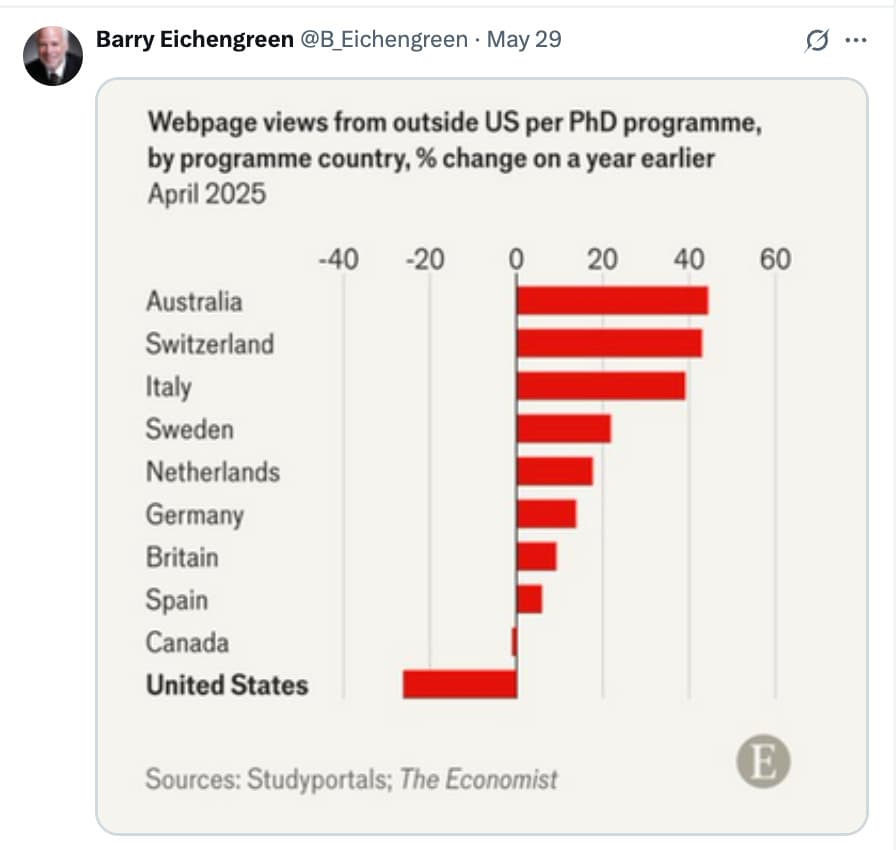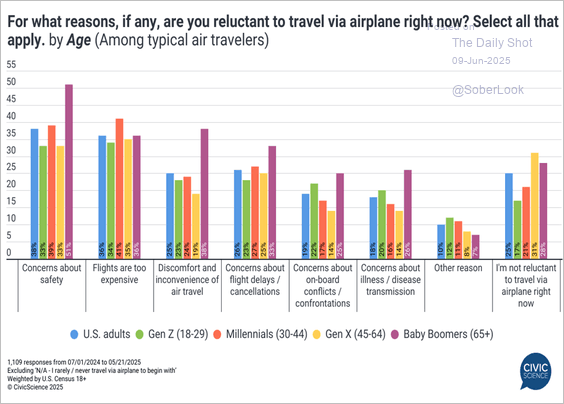PhD enrollment drop, flight safety fears, abortion gender divide
In today’s issue, we examine plummeting US PhD interest, soaring flight safety fears, abortion opinion gender gap, Big Three tennis dominance, Russia’s crumbling schools, and Reform UK.
1. Overseas interest in US PhD programmes is falling dramatically
Source: Twitter
Overseas interest in US PhD programs plunged 44% since January 2025, with hardest hits among Indian (-26.5%) and Bangladeshi (-25.7%) students. As we enter another day of unrest of LA as a result of Trumpian madness, this is quite unsurprising. Key drivers: mass visa revocations (1,000+ since Trump’s return, including for minor infractions or campus speech), policy uncertainty, and reported detentions of international students. Fallout: cascading enrollment drop (-11% YoY; ~130k fewer international students as SEVIS data reveals), postgrad start numbers down 13% for 2025-26 according to marketplace. Chilling effect from policy plus funding loss driving talent and tuition revenue shift to UK, Canada, Asia. US higher ed seen as unstable, deterring top STEM applicants and risking long-term innovation loss.
2. Huge numbers of people are avoiding flying because of fears about safety
Source: Civic Science
Sharp surge in Americans avoiding flying in 2025: an AP-NORC poll shows only 64% see air travel as “very” or “somewhat” safe, a decline from previous years. Major drivers: spike in deadly US crashes—19 fatal incidents, 106 deaths by March 2025. The last comparable airliner crash in 2009 involved multiple high-profile disasters, such as a major midair collision, onboard fires, and injuries, raising concerns about safety. FAA staffing cuts—fewer maintenance and oversight roles—amplify anxiety. High visibility of incidents via media and viral online searches (“Is flying safe?” trending) in the context of 2025 air travel trends and a spike in deadly US plane crashes raises safety concerns. This is all despite data showing car travel far riskier and recent tech upgrades (predictive AI, HEPA, biometric checks), persistent headlines and leadership turnover erode trust, driving avoidance behavior in air travel and raising safety concerns.
3. Women and men are diverging on the issue of abortion
Source: Semafor
Gallup 2025: The gender gap on abortion rights is at a record high—61% of women, 41% of men now pro-choice (20-pt gap, largest in 20+ years). Gap accelerated post-2022 Dobbs v. Jackson decision. Women's support jumped 9 pts (2021–2022); men's only 3 pts; since then, women's pro-choice support significantly outpaces men. Recent GOP-led abortion restrictions, high-profile prosecutions, and renewed legal attention (e.g., abortion pill reviews, state-level bans) have further politicized the issue, especially activating women voters and younger Democratic women (92% support among Dem women 18-29). Partisan alignment: 81% of Democratic women, 78% of Democratic men support abortion rights; no gap within Dems, but Republican women now more likely than Republican men to back abortion legality (39% vs 34%). Context: the gender gap is largely driven by sharper declines in male support post-2022 and rapidly rising female mobilization as abortion access erodes nationwide.
4. More than half of schools in 16 regions of Russia need major repairs
Source: @alex_kokcharov
Russia is half-functioning as a state. More than 50% of schools in 16 Russian regions require major repairs due to outdated infrastructure: many schools date back decades, especially in rural areas, where conditions are so deteriorated that officials report some are worse than in occupied eastern Ukraine. Contributing factors: chronic underinvestment in maintenance, prioritization of new construction over repairs, population decline in rural districts, budget constraints, plus diversion of regional infrastructure funds to the war.
5. Far right Reform UK is gaining support among Gen Z women
Source: @POLITICOEurope
Reform UK support among Gen Z women (18–26) spiked from 12% to 21% between April–May 2025 per More in Common polling (n=9,000). Surge followed local elections, driven mainly by defections from the Conservative party. Key drivers: cost-of-living and affordable housing now top priorities for young women, outweighing immigration/border issues—areas where Reform messaging shifted focus. Gen Z women, typically less receptive to right-populism, are responding to Reform’s populist anti-austerity turn, filling a vacuum left by Conservative decline and Labour’s perceived centrism. Gender gap in Gen Z politics persists, but fragmented media and online spaces accelerating viewpoint realignments; Reform’s viral social content expanding cross-gender appeal. Sudden Reform growth among young women signals broadening base, reflecting wider realignment post-Brexit and economic hardship fatigue.
6. The dominance of the Big Three (Nadal, Djokovic, Federer) is still amazing to consider
Source: r/dataisbeautiful
The "Big Three" dominated men's tennis for 21 years (2003-2024), capturing 66/84 Grand Slams (78.6%). Djokovic leads with 24 majors, Nadal 22, Federer 20, according to the Big Three). Each completed career Grand Slam); Djokovic) achieved a triple career Grand Slam, Nadal) a double. Djokovic: only man to hold all four majors) simultaneously across three surfaces; completed Career Golden Masters) twice; record 7 ATP Finals) titles. Nadal has the highest win percentage in Big Three Grand Slam matches at 66%.







